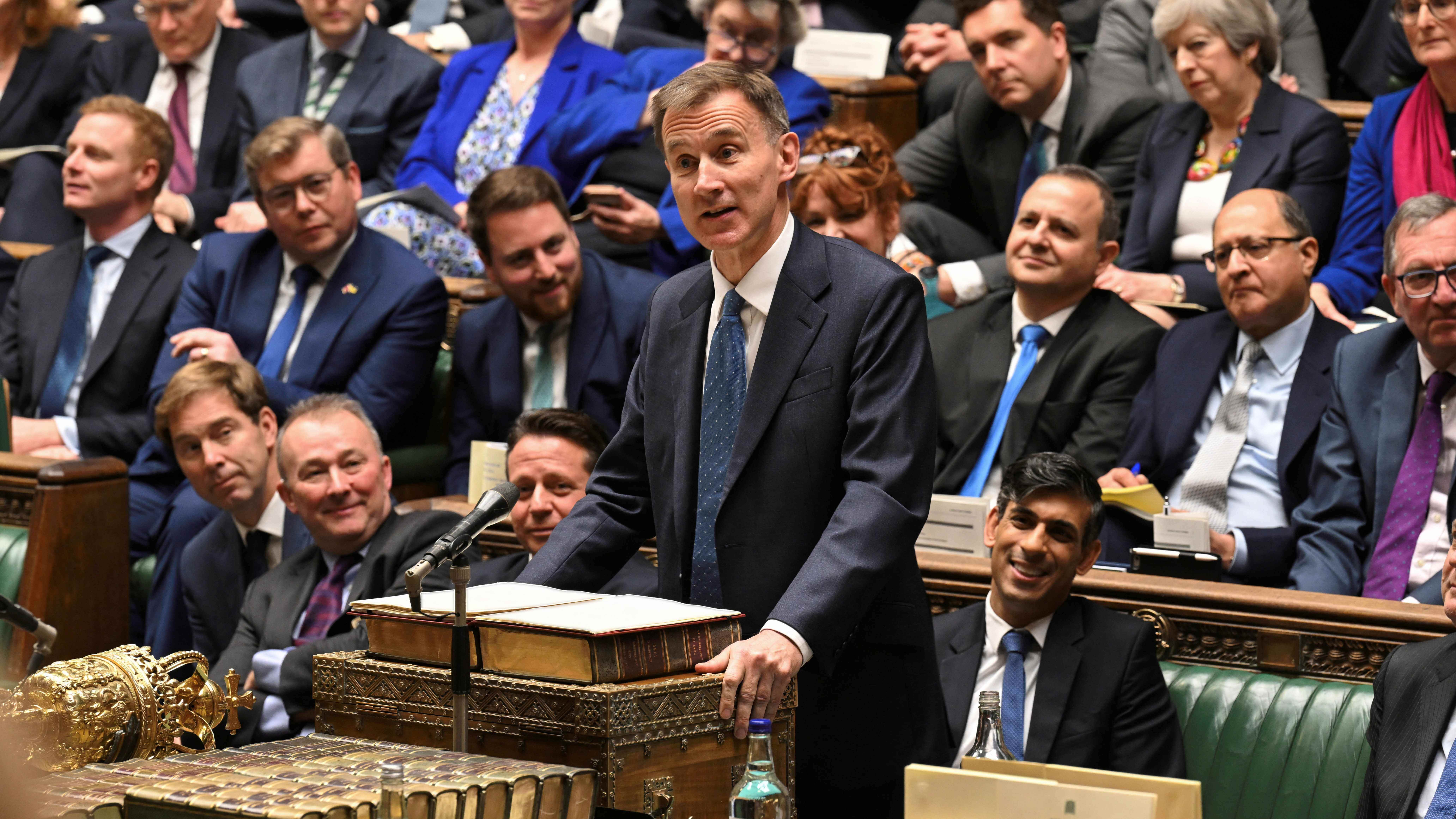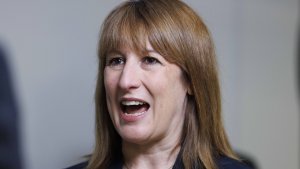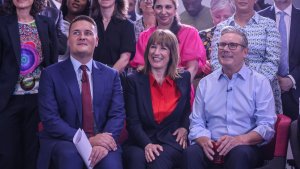UK's Hunt Seeks Pre-Election Tax Cuts In Shadow Of £2.5 Trillion Debt
After a shallow recession last year, the economy looks set to grow only slowly this year.

British finance minister Jeremy Hunt will try to use his pre-election budget next week to boost Prime Minister Rishi Sunak's flagging fortunes by cutting taxes, but without reviving bond investors' worries about the public finances.
Eighteen months after former premier Liz Truss sent markets into a tailspin with sweeping tax cut plans, Hunt remains hemmed in by promises to tackle Britain's approximately 2.5 trillion pounds ($3.2 trillion) of debt.
After a shallow recession last year, the economy looks set to grow only slowly while demands are mounting for spending on stretched public services and investment.
Debt is close to 100% of economic output, in line with many other rich economies but the highest since the 1960s after the huge costs of the COVID pandemic and energy bill subsidies.
Many lawmakers from Sunak's Conservative Party are nevertheless fuming that the tax burden is on course to be its highest since World War Two, contributing to the first post-war contraction in living standards between elections.
With the Conservatives lagging far behind the Labour Party in opinion polls and an election due in less than a year, they are desperate for Hunt to turn the tide when he delivers his budget speech in parliament on Wednesday.
"The political pressure on Hunt to deliver tax cuts is huge," Mujtaba Rahman, Managing Director Europe with consultants Eurasia Group, said. "Labour has maintained its 20-point lead in the polls, and senior Conservatives describe the budget as 'our last chance for a game-changer, before the general elections'."
Hunt offered some relief in November when he cut social security rates and gave incentives for firms to invest.
Now he wants to go further. Media reports cite possible cuts to income tax rates, another social security cut or the relaxation of a freeze on income tax thresholds which are pushing up tax bills for millions of households.
The Times reported that Hunt was considering a levy on vapes as a way of raising some extra revenue.
But budget experts worry Hunt might again claim that he can afford to cut taxes now by promising a future squeeze on public services that are already under strain.
The head of Britain's budget watchdog last month said the lack of detail about spending cuts in Hunt's November budget update was worse than a work of fiction, "given that someone has bothered to write a work of fiction".
BOND INVESTORS WATCHING
Hunt probably cares more about the verdict of the bond market.
Investors have pushed up the British government's cost of borrowing this year by more than for other countries as they factor in heavy debt sales as well as differing outlooks for interest rates and economic growth.
UK 10-year gilt yields are up around 65 basis points (bps) this year. U.S. and German yields have risen roughly 45 bps each.
"Gilt investors will not react kindly to any fiscal largesse," Mike Riddell, senior portfolio manager at Allianz Global Investors, said.
"It only took a modest loosening of the purse strings at the Autumn Statement for the market to push gilt yields materially higher relative to other bond markets."
Hunt also must consider the reaction of the Bank of England which could delay the start of interest rate cuts if his budget is judged to be inflationary by putting a lot more money in people's pockets. That risks disappointing home-owners whose mortgages are due for renewal.
But Roger Hallam, global head of rates at Vanguard, the world's second-largest asset manager, said he was not alarmed by the prospect of Hunt using most or even all of his room for manoeuvre next week.
"Does that give us any concerns around fiscal sustainability? No, it doesn't," Hallam said. "The UK economy, we think, is doing better than the consensus gives it credit for."
Estimates vary for how much money Hunt can use for tax cuts while remaining on course to hit his target of getting debt down as a share of economic output in five years' time.
Consultant Capital Economics thinks Hunt's "fiscal headroom" has risen by only 2 billion pounds from November's official estimate of 13 billion pounds.
The Resolution Foundation think tank says it could be 23 billion pounds - still less than the average available to British finance ministers since 2010.
It said Britain was stuck in the middle of a "tax-raising sandwich" with the tax giveaways of November and probably next week wedged between much bigger past and future increases, including the scheduled freeze in income tax thresholds.
James Smith, research director at the Resolution Foundation said governments typically squeeze households shortly after elections.
"History tells us that we will be getting tax rises," he said.
(Additional reporting by Dhara Ranasinghe and Yoruk Bahceli; Writing by William Schomberg; Editing by Catherine Evans)
Thanks for signing up to Minutehack alerts.
Brilliant editorials heading your way soon.
Okay, Thanks!

